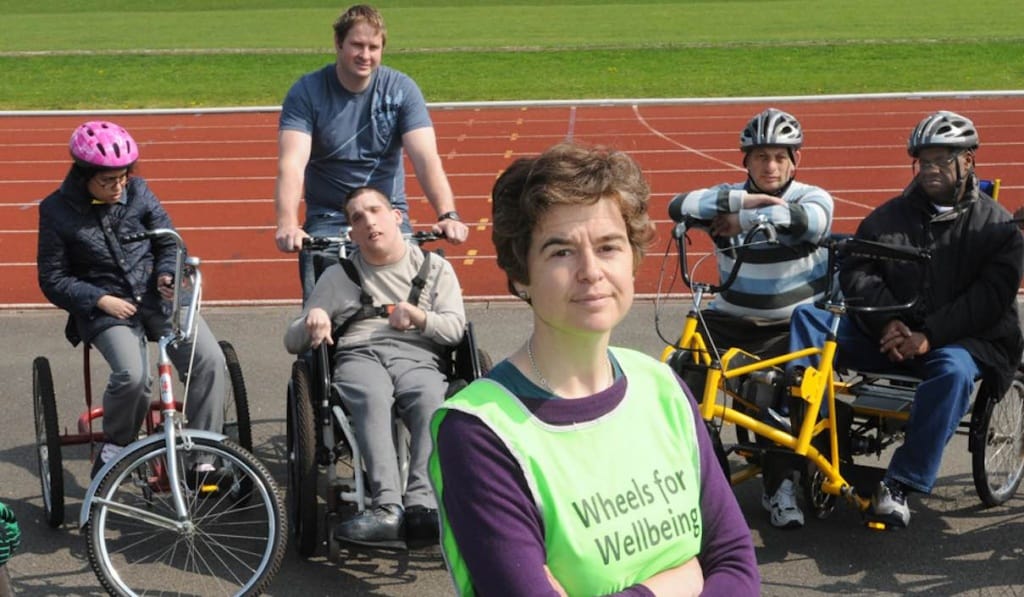The Founder of Wheels for Wellbeing
In the lead up to our Beyond the Bicycle Conference, we are looking at some key issues and perspectives around inclusive cycling. This week we hear directly from Janet Paske, founder of Wheels for Wellbeing. Our Beyond the Bicycle Conference is taking place on Tuesday 7th November at City Hall, in Central London. Learn more and book online here.
As Wheels for Wellbeing is turning 10 years old, we thought it was only fitting to interview the person who created it all in 2007, Janet Paske. Being a keen cyclist herself and working for Disability Advice Service Lambeth (DASL) at the time, Janet realised there wasn’t much going on in terms of encouraging disabled people to cycle. After carrying out extensive research she quit her job and started working full time on the project which would soon become Wheels for Wellbeing.

What were you doing before Wheels for Wellbeing?
I was working four days a week at DASL. Although it was an enormously satisfying job but I felt – I don’t know if you’ve ever felt this – as if I wasn’t put on the planet to work there. I kept thinking and thinking ‘what could I do next?’. Outside of work I used to do a lot for Lambeth cyclists, a local branch of London Cycling Campaign. From organising rides and classes and being a passionate cyclist myself, I could see the physical and mental benefits of cycling. Then it struck me. Why aren’t there more organisations encouraging disabled people to cycle? Combining my enthusiasm for cycling and my work at DASL, I began looking into projects around London that promoted inclusive cycling. After months and months, I realised I had to put my money where my mouth is. My big thing is ‘if you don’t try you won’t succeed’, so I resigned from DASL and started to work on Wheels for Wellbeing full time.
What were the initial challenges you faced in starting up Wheels for Wellbeing?
In short, we had no money. The landlord however, was very supportive and gave us office space for a whole year so I didn’t have to pay any rent. The room I was first working in had no windows and the only light coming in was through the door! Really though the biggest challenges were getting money and finding trustees. Initially the idea of a charity being set up for disabled people to cycle raised a few eyebrows!
Where did the sessions first start? How many were there to begin with?
In Croydon, parent Liz Mincer had been running inclusive cycling sessions for six years. I met Liz at the right time, she wanted to move on from the project and we were looking for a starting point. We took over ‘Cycling for All’ and from this Wheels for Wellbeing was born. After that we introduced the Lambeth sessions and things took off from there.
What do you think of the progress of Wheels for Wellbeing after you left?
I think it’s absolutely fantastic! Back then, when talking to TFL I always felt like a tiny voice not taken seriously. Now Wheels for Wellbeing is established and we are making people at the national level understand the seriousness of what we are about.
Where do you see the future for Wheels for Wellbeing?
More joys as more people discover cycling, more campaigning successes and of course, a lot more hard work! What I’d really like is for Public Health England to recognise the benefits of cycling for disabled people particularly, initially through funding research in this area. And given the knock-on effects of keeping people out of hospitals, it seems like a massive win for the NHS to promote this kind of physical activity.
What are you doing now?
After being director of Wheels for Wellbeing until 2010, I moved to Sheffield to live with my partner. Now, I’ve just finished my first year in training to be an occupational therapist. I’ve done a lot of things in my past and want to do something that will give me satisfaction. In occupational therapy, there is an enormous amount of variety which suits me.
Why should occupational therapists attend the conference (ie. how does inclusive cycling fit into their practice)?
I would encourage all occupational therapists to attend Wheels for Wellbeing’s 10th anniversary conference as it is a good opportunity to understand better why inclusive cycling is an occupation to consider as an intervention, especially as part of Making Every Contact Count conversations.
People who have acquired an impairment or long term health condition, with the associated motor, sensory, perceptual or psychosocial challenges, will be astonished at the range of cycles available, all enhancing freedom, control and independence.
If occupational therapists need further encouragement, the National Lead for Adult Health and Wellbeing from Public Health England will be speaking, together with the Clinical Lead on Physical Activity for the Royal College of GPs. Both will contribute to a discussion exploring the benefits of cycling for disabled people.
Attending the conference will of course, contribute to CPD too.
Any last words?
I’d just like to thank everyone who has been involved, all the people who have put in their little bit to get WFW to where it is now, all the trustees, and a big thank you to Isabelle who is so dedicated and such a fantastic ambassador for Wheels for Wellbeing.
Our Beyond the Bicycle Conference is taking place on Tuesday 7th November 2017 at London’s Living Room, City Hall, in Central London. BOOK NOW..
